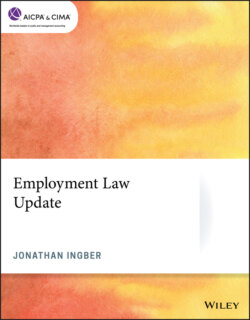Читать книгу Employment Law Update - Jonathan Ingber - Страница 58
Exhibit 2-3 A social media policy that passes muster
ОглавлениеThe NLRB's Acting General Counsel issued three memos on social media use at work, the last of which was issued on May 30, 2012. This memo includes a copy of the Walmart social media policy, which is the only policy that the NLRB's Acting General Counsel has approved in its entirety. Although a number of commentators have warned against blindly copying the Walmart policy — principally because it allows the company to discipline employees for off-duty conduct, which is illegal in California and several other states, and increases the level of control over employee conduct, which can actually add to an employer's liability — the policy is nonetheless instructive, as are the Costco and EchoStar decisions. The NLRB memo and a copy of Walmart's policy attached to the memo can be found at https://www.nlrb.gov/case/11-CA-067171.
On August 18, 2016, the NLRB issued its decision in the “social media policy” case involving Chipotle Services LLC d/b/a Chipotle Mexican Grill. The case was decided by an administrative law judge in March 2016, after which Chipotle and the NLRB filed exceptions. Here are the key takeaways from the NLRB's decision and parts of the ALJ's decision not addressed by the NLRB:
A social media policy that prohibits “improper use” of the employer's logo does not violate the employees' rights to engage in protected concerted activity (for example, wearing a t-shirt with the corporate logo in a protest of working conditions).
A social media policy that prohibits disclosure of incomplete, confidential, or inaccurate information should be accompanied by examples showing that the prohibitions do not apply to protected speech, such as the right to discuss compensation.
A disclaimer in the social media policy such as, “[t]his [social media] code does not restrict any activity that is protected by the National Labor Relations Act,” will not remediate provisions of the policy that violate the law.
A social media policy that prohibits harassing or discriminatory statements will withstand challenge, but prohibitions of “false or defamatory” statements may be overbroad and invalid, because employees have a protected right to make derogatory statements about the terms and conditions of employment. Statements that are maliciously false — in other words, knowingly false — can be prohibited.
You can see from these key points that the employer must walk a fine line balancing the social media rights and protected action and speech of employees against the employer's rights to protect the employer's intellectual property, business information, and, at least to some extent, reputation. This highwire balancing act is not for the faint of heart.
